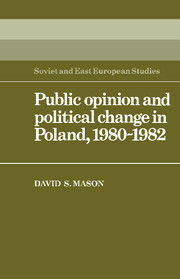Book contents
- Frontmatter
- Contents
- List of tables
- Preface
- Introduction: public opinion and politics
- 1 Public opinion research in Poland
- 2 The public and policy change in the 1970s
- 3 Values of Polish society on the eve of August
- 4 1980: causes and results
- 5 The rise and fall of Solidarity
- 6 The Party and ‘renewal’
- 7 Solidarity and the regime at the end of 1981
- 8 Martial law as a response and the response to martial law
- 9 Conclusions
- Appendix
- References
- Index
1 - Public opinion research in Poland
Published online by Cambridge University Press: 05 February 2012
- Frontmatter
- Contents
- List of tables
- Preface
- Introduction: public opinion and politics
- 1 Public opinion research in Poland
- 2 The public and policy change in the 1970s
- 3 Values of Polish society on the eve of August
- 4 1980: causes and results
- 5 The rise and fall of Solidarity
- 6 The Party and ‘renewal’
- 7 Solidarity and the regime at the end of 1981
- 8 Martial law as a response and the response to martial law
- 9 Conclusions
- Appendix
- References
- Index
Summary
Public opinion research became part of the ‘renewal’ that swept across Poland in 1980 and 1981. The topics available for study during this period were practically unlimited, and studies that would have been kept under lock and key before 1980 were now made available to the public. Universities, periodicals, and even Solidarity conducted public-opinion surveys with little central supervision or censorship. All of this was a function of the changed environment, but also became an important factor in shaping the political environment. Political actors on both sides attempted to use the survey data issuing from this period to bolster their positions. Public opinion research, like so much else in Poland, became highly politicized.
POLISH PUBLIC OPINION RESEARCH BEFORE 1980
The development of public opinion research in Poland is thoroughly addressed in Sicinski (1963, 1967), Huszczo (1977) and Ward (1981) and will be only summarized here. The evolution of official attitudes towards public opinion research and its use was similar to the regional pattern described in the Introduction. Poland, however, has been slightly ahead of the pack on most of these issues. Poland has the richest tradition in sociological research in Eastern Europe, and was the first to begin systematic public opinion polling. Polish sociologists were among the first to take advantage of the ‘thaw’ in the region after the death of Stalin, with the establishment by the Polish Academy of Sciences (Polska Akademia Nauk, hereafter PAN) of a Center for Sociological Research in 1954.
- Type
- Chapter
- Information
- Public Opinion and Political Change in Poland, 1980–1982 , pp. 12 - 37Publisher: Cambridge University PressPrint publication year: 1985

